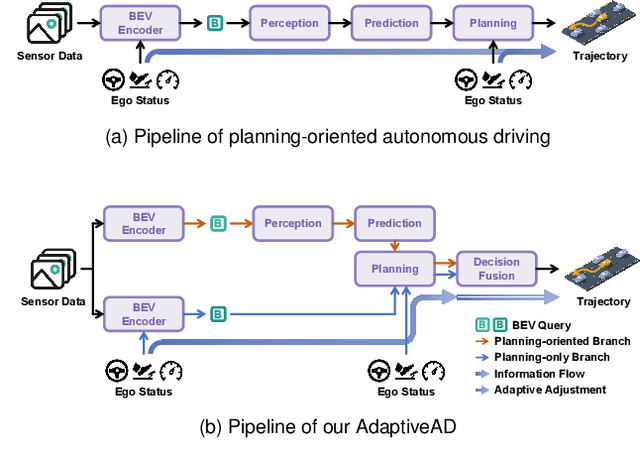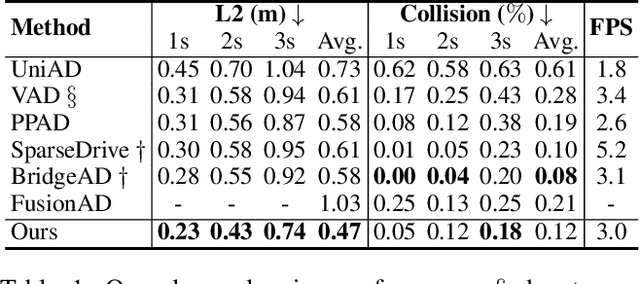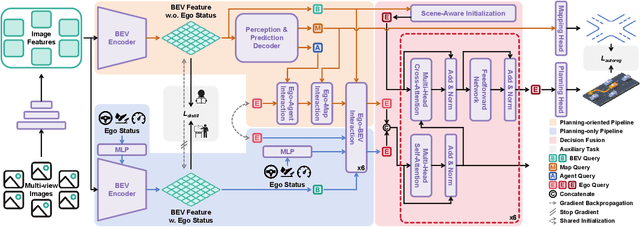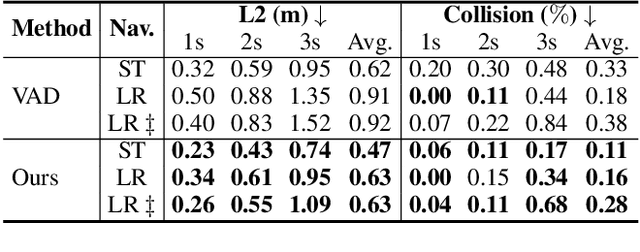Jiacheng Tang
Decoupling Scene Perception and Ego Status: A Multi-Context Fusion Approach for Enhanced Generalization in End-to-End Autonomous Driving
Nov 18, 2025



Abstract:Modular design of planning-oriented autonomous driving has markedly advanced end-to-end systems. However, existing architectures remain constrained by an over-reliance on ego status, hindering generalization and robust scene understanding. We identify the root cause as an inherent design within these architectures that allows ego status to be easily leveraged as a shortcut. Specifically, the premature fusion of ego status in the upstream BEV encoder allows an information flow from this strong prior to dominate the downstream planning module. To address this challenge, we propose AdaptiveAD, an architectural-level solution based on a multi-context fusion strategy. Its core is a dual-branch structure that explicitly decouples scene perception and ego status. One branch performs scene-driven reasoning based on multi-task learning, but with ego status deliberately omitted from the BEV encoder, while the other conducts ego-driven reasoning based solely on the planning task. A scene-aware fusion module then adaptively integrates the complementary decisions from the two branches to form the final planning trajectory. To ensure this decoupling does not compromise multi-task learning, we introduce a path attention mechanism for ego-BEV interaction and add two targeted auxiliary tasks: BEV unidirectional distillation and autoregressive online mapping. Extensive evaluations on the nuScenes dataset demonstrate that AdaptiveAD achieves state-of-the-art open-loop planning performance. Crucially, it significantly mitigates the over-reliance on ego status and exhibits impressive generalization capabilities across diverse scenarios.
ReAgent: Reversible Multi-Agent Reasoning for Knowledge-Enhanced Multi-Hop QA
Mar 10, 2025



Abstract:Recent advances in large language models (LLMs) have significantly improved multi-hop question answering (QA) through direct Chain-of-Thought (CoT) reasoning. However, the irreversible nature of CoT leads to error accumulation, making it challenging to correct mistakes in multi-hop reasoning. This paper introduces ReAgent: a Reversible multi-Agent collaborative framework augmented with explicit backtracking mechanisms, enabling reversible multi-hop reasoning. By incorporating text-based retrieval, information aggregation and validation, our system can detect and correct errors mid-reasoning, leading to more robust and interpretable QA outcomes. The framework and experiments serve as a foundation for future work on error-tolerant QA systems. Empirical evaluations across three benchmarks indicate ReAgent's efficacy, yielding average about 6\% improvements against baseline models.
From Metaphor to Mechanism: How LLMs Decode Traditional Chinese Medicine Symbolic Language for Modern Clinical Relevance
Mar 04, 2025Abstract:Metaphorical expressions are abundant in Traditional Chinese Medicine (TCM), conveying complex disease mechanisms and holistic health concepts through culturally rich and often abstract terminology. Bridging these metaphors to anatomically driven Western medical (WM) concepts poses significant challenges for both automated language processing and real-world clinical practice. To address this gap, we propose a novel multi-agent and chain-of-thought (CoT) framework designed to interpret TCM metaphors accurately and map them to WM pathophysiology. Specifically, our approach combines domain-specialized agents (TCM Expert, WM Expert) with a Coordinator Agent, leveraging stepwise chain-of-thought prompts to ensure transparent reasoning and conflict resolution. We detail a methodology for building a metaphor-rich TCM dataset, discuss strategies for effectively integrating multi-agent collaboration and CoT reasoning, and articulate the theoretical underpinnings that guide metaphor interpretation across distinct medical paradigms. We present a comprehensive system design and highlight both the potential benefits and limitations of our approach, while leaving placeholders for future experimental validation. Our work aims to support clinical decision-making, cross-system educational initiatives, and integrated healthcare research, ultimately offering a robust scaffold for reconciling TCM's symbolic language with the mechanistic focus of Western medicine.
Change Detection of Markov Kernels with Unknown Post Change Kernel using Maximum Mean Discrepancy
Jan 27, 2022

Abstract:In this paper, we develop a new change detection algorithm for detecting a change in the Markov kernel over a metric space in which the post-change kernel is unknown. Under the assumption that the pre- and post-change Markov kernel is geometrically ergodic, we derive an upper bound on the mean delay and a lower bound on the mean time between false alarms.
 Add to Chrome
Add to Chrome Add to Firefox
Add to Firefox Add to Edge
Add to Edge